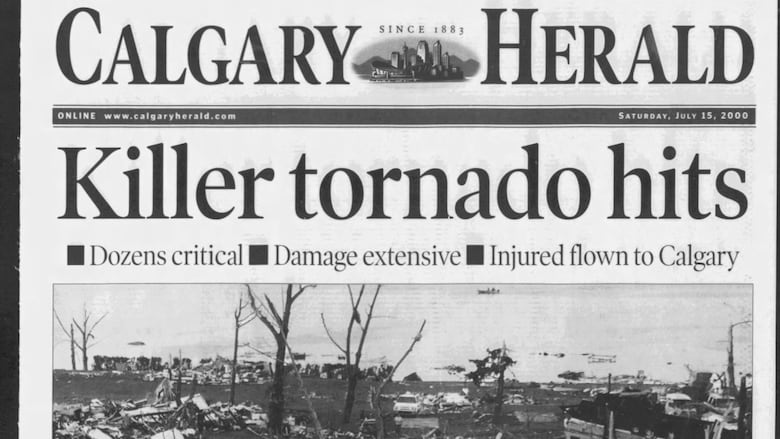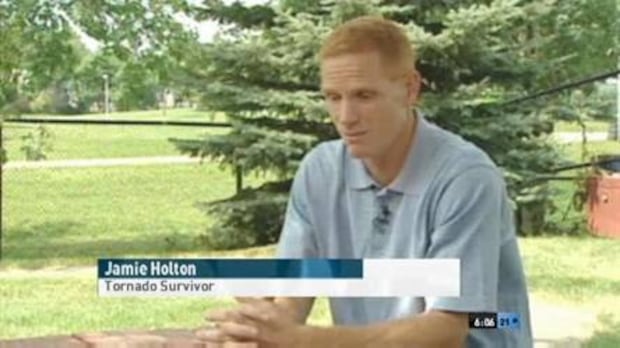Reflecting on Pine Lake's deadly tornado 25 years later
A journalist and severe weather expert remember a twister that killed 12 in central Alberta

When Andrew Schultz arrived in Pine Lake, Alta. a quarter century ago, just after one of Canada's most damaging tornados had swept through the area, he had no idea what he was walking into.
After a severe thunderstorm warning went out during the RDTV weather anchor's evening newscast in Red Deer, Schultz and a camera operator heard separate calls within a minute for STARS air ambulances in Calgary and Edmonton to fly to Pine Lake in central Alberta. The journalists decided to skip dinner, hop in the car, and see what was happening for themselves.
When they arrived at the scene of the twister, the journalists found toppled trees, overturned cars and clearly-injured people in shock searching the area for loved ones.
"25 years later, I have the same feeling right now, which is to me, it seemed surreal," Schultz said in an interview with CBC News.
"We were just dumbfounded looking around wondering what had happened, and at the same time, people were fresh from the destruction that was the tornado."
This week marked the 25th anniversary of the deadly tornado that hit Pine Lake, Alta. The storm killed 12 people and injured more than 100 when it tore through the Green Acres campground in central Alberta on July 14, 2000.
The storm was strong enough to throw cars up to 50 metres, damage houses and leave some RVs and trailers unrecognizable. Its wind reached speeds of 300 km/h as the storm spanned more than a kilometre.
Schultz started working to capture footage and tell the story of what they were seeing, as he was processing it himself. RDTV continued broadcasting that Friday night until past 2 a.m. the following morning as news crews gathered more information and footage.
Colleagues from Edmonton and Calgary arrived in the area to cover the story. U.S. outlets like CNN and ABC called Schultz to discuss the storm. And coverage continued for weeks about the aftermath and recovery to the storm.
To this day, Schultz says he's not sure if he arrived at the site three or 15 minutes after the storm had passed, but one part of the scene that will stick with him forever is the peaceful weather he found after the tornado had passed.
"It was the most serene weather I had ever experienced in my entire life when we got there," said Schultz.
"It wasn't the calm before the storm, but intense still and calm following the storm."
Rare F-3 storm
The tornado that Pine Lake was measured as a powerful F-3 storm, the likes of which is rare to see in Canada.
"We see a F-3 tornado maybe once every five years across Canada," said Dave Sills, director of the Northern Tornadoes Project at Western University in London, Ont.
The F-3 rating refers to the estimated wind speed of the storm. The last time Alberta saw a tornado that powerful was the EF4 storm that destroyed several homes near Didsbury, north of Calgary, in 2023.
Alberta averages roughly 11 tornadoes per year, Sills said, but the Pine Lake twister is one of the most significant storms the country has seen due to its size and how it hit a populated area.
The conditions for the tornado were due to a supercell thunderstorm formed by a dry line, which is a meteorological feature where warm, dry air and moist, cooler air on either side of the Rockies are separated by a boundary that big storms can form along.
"It had a really long track, 27 kilometres, and the maximum width was 1.6 kilometres, that's exactly a mile. So this was a mile-wide tornado. That's not very typical in Alberta," said Sills.
The far reach of severe weather
The story is a reminder of the awesome power of nature, Schultz said, evoking memories of the 1987 tornado in Edmonton that killed 27 people and injured 600 more.
"[Despite] AI in 2025 and different technological advancements, certainly we are impacted and affected by nature and weather systems perhaps much more than we'd like to admit," said Schultz.
Schultz was immersed in covering the story for weeks, he's been interviewed about it for nearly every major anniversary since it occurred, and he remembers psychological support was offered to every member of RDTV's station to help them process what they were seeing and covering.
But the most significant element of the story is the lives the storm took and the people who lost family or friends, Schultz said. Just like Edmonton's recovery from the 1987 tornado, he said the Pine Lake storm was a reminder of the reach of severe weather and how its memory can stay with people living in the area.
"I was part of it, and I was there to chronicle it," said Schultz. "Sure, it affected me, but it very much is an event that will belong with and live with those folks who were directly impacted forever."



